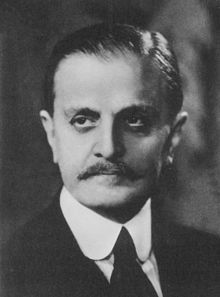Carlos Saavedra Lamas
Carlos Saavedra Lamas (born November 1, 1878 in Buenos Aires , Argentina , † May 5, 1959 ibid) was an Argentine legal scholar and politician . He mediated in the Chaco War between Bolivia and Paraguay and negotiated non-aggression pacts between various South American states. In 1936 he received the Nobel Peace Prize for these achievements .
life and work
Education and academic career
Carlos Saavedra Lamas was born in Buenos Aires in 1878 to an aristocratic family. After completing his school education, he studied law . While still a student, on a trip to Paris , he got to know the legal and economic relationships between nations, especially in agriculture. Lamas received his PhD from the Universidad de Buenos Aires , then became Professor of International Law and taught law and sociology at the University of La Plata . His academic specialty was labor law , on which he published several works.
He was involved in the founding of the International Labor Organization (ILO) in 1919, which promotes justice in the world of work across countries. In 1928 he was head of the Organization's Argentine delegation in Geneva and became President of the ILO Conference. Much of his work has been implemented by Argentine legislation. From 1941 to 1943 he was president of the University of Buenos Aires, until 1946 professor.
Political career and Nobel Peace Prize
Lamas' political career began in 1906. From 1908 he was a member of the Argentine parliament for two terms . In 1915 he was Minister of Justice and Education in his country and in this capacity he was responsible for reforming the school system. He put a focus on promoting vocational schools in order to guarantee high-quality training for skilled workers. At the same time, he campaigned for the content-related coordination of agricultural and labor policy in the country.
From 1932 to 1938 he was Foreign Minister in the government of General Agustín Pedro Justo , who was accused of massive election fraud . In 1933, at the 7th International Conference of American States in Montevideo, he was able to push through a draft to outlaw war, which was signed by six American states as the Saavedra Lamas Treaty in the same year in Rio de Janeiro . In it the non-aggression pacts between various South American states were consolidated. In 1935, Lamas was involved in negotiating a peace treaty between Bolivia and Paraguay in the Chaco War, in which it was a matter of access rights to oil discoveries in the disputed area. In October of that year, the state of war was ended with an agreement in an internal American special committee. For these achievements, Lamas was awarded the Nobel Peace Prize in 1936. In 1938 he withdrew from political activities.
Carlos Saavedra Lamas died in Buenos Aires in 1959. The headland Punta Saavedra in Antarctica is named after him.
The medal that Lamas received as a Nobel Peace Prize Laureate was auctioned off to an Asian collector in March 2014 for $ 1.1 million.
Individual evidence
literature
- Bernhard Kupfer: Lexicon of Nobel Prize Winners . Patmos Verlag, Düsseldorf 2001, ISBN 3-491-72451-1 .
Web links
- Information from the Nobel Foundation on the award ceremony for Carlos Saavedra Lamas in 1936
- Newspaper article about Carlos Saavedra Lamas in the press kit of the 20th century of the ZBW - Leibniz Information Center for Economics .
| personal data | |
|---|---|
| SURNAME | Lamas, Carlos Saavedra |
| BRIEF DESCRIPTION | Argentine politician |
| DATE OF BIRTH | November 1, 1878 |
| PLACE OF BIRTH | Buenos Aires |
| DATE OF DEATH | May 5th 1959 |
| Place of death | Buenos Aires |

